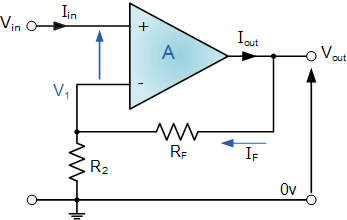NonBio
Newbie level 4

Hi!
Considering this circuit:
**broken link removed**
Vout = A(Vin -Vout*R2/(R2+Rf)), which simplifies to Vout = Vin*(R2+Rf)/R2.
If we now assume that R2 = Rf, then the gain A = 2. And assume that Vin = 5V.
Then:
1) Initially Vout = 0.
2) After some time Vout = 2*(5-0/2) = 10V
3) After the same time Vout = 2*(5-10/2) = 0V
4) After the same time Vout = 2*(5-0/2) = 10V
5) and so on..
By "some time" I mean the time it takes the Vout*R2/(R2+Rf) appear across V-.
Does this mean the output is jumping from 0 to 10V in very tiny fractions of time? Assuming that the output can't change instantaneously.
Please correct me, if I am wrong, cause this is a very important concept.
Thank you!
Considering this circuit:
**broken link removed**
Vout = A(Vin -Vout*R2/(R2+Rf)), which simplifies to Vout = Vin*(R2+Rf)/R2.
If we now assume that R2 = Rf, then the gain A = 2. And assume that Vin = 5V.
Then:
1) Initially Vout = 0.
2) After some time Vout = 2*(5-0/2) = 10V
3) After the same time Vout = 2*(5-10/2) = 0V
4) After the same time Vout = 2*(5-0/2) = 10V
5) and so on..
By "some time" I mean the time it takes the Vout*R2/(R2+Rf) appear across V-.
Does this mean the output is jumping from 0 to 10V in very tiny fractions of time? Assuming that the output can't change instantaneously.
Please correct me, if I am wrong, cause this is a very important concept.
Thank you!




